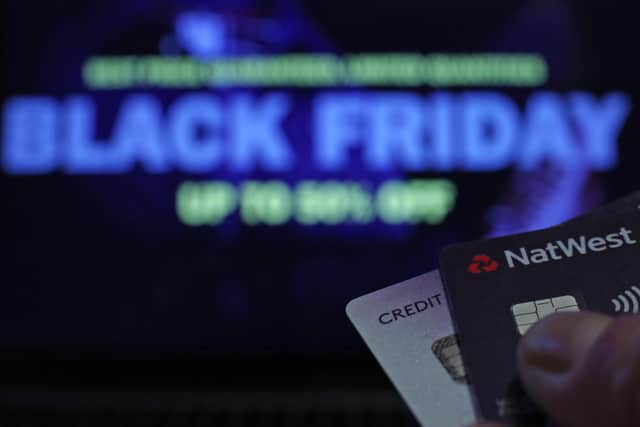How Black Friday began, when it caused fistfights and why people are questioning its 'bargains'
The concept originated in America as the first day of the Christmas shopping season after Thanksgiving but has spread around the world.
While there are multiple explanations as to how the name was chosen – with the most popular one put forward being the idea that it was the day that many retailer went out of the red and into the black for the year as big sales turned annual losses into profits.
Advertisement
Hide AdAdvertisement
Hide AdBut whatever its origins while the name is in common parlance now, it was far from universally popular with shopping bosses.


In a 1985 article in The Philadelphia Inquirer, the National Retail Merchants Association, provided a statement condemning it.
They said: "Black Friday is not an accepted term in the retail industry and as far as retailers are concerned, it is understood to mean the Friday the stock market crashed in 1929."
That battle was lost and in recent years, Black Friday has spread far beyond the shores of America – with many British shoppers having little idea of its link to Thanksgiving.
Advertisement
Hide AdAdvertisement
Hide AdBut in addition to the theoretical 24-hour window to bag a bargain now being stretched out over several days, a week or even longer, there are persistent and growing questions about exactly how good Black Friday offers really are.
Earlier this week, a new study revealed that just one in seven Black Friday deals offer a genuine discount and the vast majority of promotions are cheaper or the same price in the six months before the sales event.
Which? analysed 214 Black Friday deals last year across seven major retailers – Amazon, AO, Argos, Currys, John Lewis, Richer Sounds and Very – looking at their prices every day in the six months before and after last year’s event on November 26.
The watchdog found 183 (86 per cent) were cheaper or the same as their Black Friday price in the six months before the event and 209 (98 per cent) were cheaper or the same price at other times in the year.
None was cheaper on Black Friday alone.
Advertisement
Hide AdAdvertisement
Hide AdWhich? concluded that although there were some deals to be had on Black Friday, genuine discounts were “often few and far between”.
Which? urged consumers not to “fall for the hype” without carefully examining whether items were really worth buying and that the “discounted” price offered a genuine saving.
In one example, Which? found a Zanussi ZHB62670XA chimney cooker hood was £239 on Black Friday in 2021 at John Lewis, with a £30 saving, but had been the same price since November 9 and was reduced to £160 for a fortnight in August.
It only increased to £269 on October 13, meaning that the so-called £30 saving did not amount to a worthwhile deal.
Advertisement
Hide AdAdvertisement
Hide AdWhich? retail editor Reena Sewraz said: “Our research shows that finding a good deal on Black Friday is like looking for a needle in a haystack. It’s rarely the cheapest time to shop.”
Even for those who do still enjoy hunting out genuine bargains, Black Friday has generally become a somewhat calmer (and often more online-based) experience than even just a few years ago.
Back in 2014, as attempts to make the event a fixture in the British shopping calendar saw cheerleaders greet shoppers at an Asda store in West London, the battle for bargains became a real rather than figurative fight.
Shoppers argued, fought, swore and grabbed items off each other as heavily-discounted televisions were among the goods people became increasingly irate over.
Advertisement
Hide AdAdvertisement
Hide AdAndrew Moore, the supermarket’s chief merchandising officer, subsequently told reporters: “We can’t condone some of the activities we have seen today, we have got some learning to do.”
Following the scenes, Financial Times journalist Brooke Masters explained: “Black Friday Mayhem is a real tradition in the US. There are shootings, there are stampedes, people fight in the parking lot. Last year [2013], a guy got shot outside of a Las Vega Target store because he had just bought a highly-discounted TV and two thugs tried to take it from him.”
Although physical retailers have become wiser to heading off confrontations through measures such as limiting numbers coming into stores at any one time, there is a growing threat to customers not from each other but from online fraudsters.
This week, hundreds of listings for potentially counterfeit products have been removed from Instagram ahead of Black Friday in a joint crackdown by Trading Standards and Meta.
Advertisement
Hide AdAdvertisement
Hide AdThe listings included electrical goods such as phone accessories and potentially dangerous chargers as well as fake clothing and fashion accessories, jewellery, tobacco, car parts and copyrighted photographs.
Colin Mathieson, spokesperson for Advice Direct Scotland, said: “It can be extremely difficult to tell the real from the fake, particularly when shopping online.
“We would encourage consumers to check that the goods they are purchasing are genuine, by following our top tips, including buying from reputable retailers.
“And, as always, people should remember that if something sounds too good to be true, then there’s a high chance that it is.”